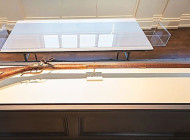By Greg Smith
TEXAS – Despite relaxed regulations from Texas Governor Greg Abbott that would allow museums and libraries to open in limited capacity on May 1, most do not feel it is safe to open and will remain closed for the time being.
The preceding day, April 30, was a grim day in Texas. That day saw 50 deaths in the state on account of COVID-19, the highest total the state had recorded yet, in addition to 1,033 positive tests, the third highest day the state had recorded since the outbreak began.
On April 30, director of the National Institutes of Allergy and Infectious Diseases, Dr. Anthony Fauci, said some states are taking a “really significant risk” by easing restrictions at this time.
Abbott allowed the state’s stay-at-home order to expire on April 30 and said museums, libraries, restaurants and theaters can reopen at 25 percent occupancy for the time being.
The decision to allow museums to open puzzled and surprised many in the state, as museums are far from essential businesses and are entirely dedicated to leisure.
In Fort Worth, the Amon Carter Museum of American Art, the Kimbell Art Museum, the Modern Art Museum of Fort Worth and the Fort Worth Museum of Science and History have all indicated they will remain closed for at least a few weeks longer. The Fort Worth Public Library will keep all 15 of its branches closed.
Amon Carter spokeswoman Kimberly Daniell told the Star-Telegram “it would ‘take some time’ to implement the proper health procedures to protect staff and visitors from the spread of the novel coronavirus. We look forward to welcoming audiences back to the museum at a later date, and we will announce our plans to reopen as soon as we know we are able to do so safely.”
In Houston, museums that will remain closed include the Menil Collection, the Museum of Fine Arts Houston, and the Children’s History Museum. The Houston Museum of Natural Science plans to reopen on May 25, and the Holocaust Museum Houston plans to open May 26.
“Our ‘Return to Work Task Force’ has been actively working to determine how best to safely reopen the MFAH for our 650 staff and our visitors,” a spokesperson for the Museum of Fine Arts, Houston, said. “We will be coordinating with our sister institutions in the Houston Museum District and with the mayor’s office. We look forward to bringing some staff back into the buildings and welcoming the public, but we are evaluating all of our supplies, including masks and gloves, and assessing our infrastructure to ensure that we are ready to operate the museum’s offices and public areas safely and under social distancing. As soon as all of those aspects are within view, we will be announcing a reopening date.”
Other Texas institutions such as the Dallas Museum of Art will stay closed. They said, “We are aware of the inclusion of museums in the state’s phase one plan to reopen. With the health and safety of our visitors and staff as our top priority, the DMA will not reopen on May 1. We will confirm a reopening timeline as soon as we determine that we can do so with the proper measures in place.”
The Nasher Sculpture Center said in a Facebook post, “While the Governor of Texas has listed museums among those entities permitted to participate in Phase 1 reopening, the Nasher Sculpture Center will hold off reopening, with the health and safety of staff and visitors as our highest priority.”
Elsewhere in the state, the Museum of Texas Tech, the Museum of the Southwest and the Permian Basin Petroleum Museum will remain closed.
The privately run Ellen Noël Art Museum in Odessa stood apart from the field, planning to open their doors with admittance limited to 30 people at a time.
The 31 state-operated sites overseen by the Texas Historical Commission (THC) reopened in most cases, though offices of the THC and Friends of the Texas Historical Commission remain closed to the public until further notice. While some of THC’s sites are outdoors, a number of them are centralized on an indoor structure, such as a historic home, or have indoor guest centers associated with the properties. They have started giving tours to the public on a by-reservation basis.
“We want our staff and our visitors to be safe, and we’re enthusiastic to get those sites open and get people to learn about Texas history,” THC communications director Chris Florance said.
Public-facing staff at THC properties will be wearing masks, and they ask that guests wear masks as well.
As a state-run organization, Florance said that when the directive came to open the state from Abbott, the THC did not consider the avenue to stay closed.
THC said they have increased cleaning efforts, will only allow 25 percent capacity, have canceled all in-person events and facility rentals, and the sites are currently not open for overnight stays.
The state of Ohio also announced a reopening plan this week, though it explicitly categorized museums as a “place of public amusement,” and barred their reopening for the time being.




